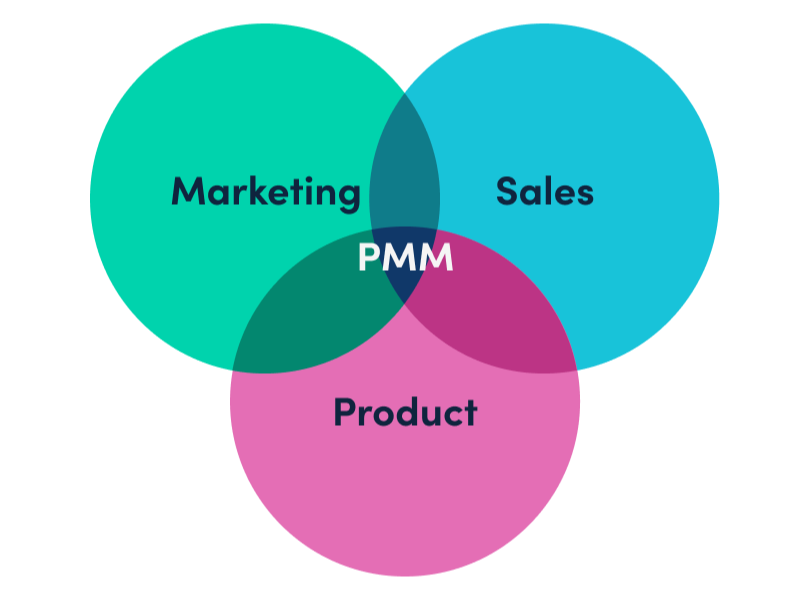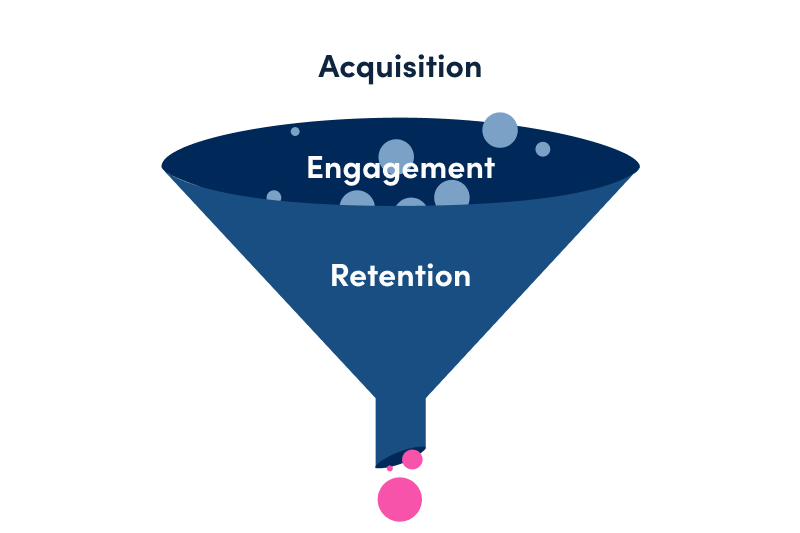Updated: April 3, 2024 - 9 min read
Product Marketing Managers straddle the boundary between product, marketing, and sales, emphasizing the importance of messaging, go-to-market strategies, and product launches within the world of product management.

What does a Product Marketing Manager do?
Product Marketing, much like digital and traditional marketing, involves getting the product to market and making sure it reaches the right customers.
When we hear the word ‘marketing’, it’s usually preceded by things like ‘social media’, ’email campaigns, and ‘blogging,’ but Product Marketing is so much more than that!
Marketing tells the story of a product, and helps communicate what the brand stands for. If you have a competitor who has a remarkably similar product to yours, it’s your storytelling – your Why – which will set you apart and help you find your customers.
A Product Marketing Manager owns the positioning, messaging, and branding of a product. They will also gather and process customer feedback, and manage some aspects of customer relations after launch. Essentially, they work on moving customers through a funnel that converts them from a general audience, into loyal fans.

A common misconception of Product Marketing is that it focuses mainly on acquisition. However, there’s no point attracting new customers if you can’t keep them! Marketing works to nurture customers throughout their journey with a product in order to keep churn rates down.
A Product Marketing Manager will constantly be working on different tasks for customers at these three levels of the funnel.
Acquisition: Getting the customer's attention, making people aware that your product exists, and peaking their interest, for instance on social media.
Engagement: Getting people involved in your community of fans, such as by attending events.
Retention/Conversion: Keeping customers coming back either through subscription models or recurring purchases.
Product Marketing Manager responsibilities
Product Marketing is difficult to define because it varies from company to company, and it can even vary between different products! Take a look at these different examples of Product Marketing roles at different Google and Fitbit.
Product Marketing Management responsibilities at Google:
Partner with consumer researchers to design, implement, and then synthesize insights from primary consumer research and competitive analyses.
Work closely with Product Managers and User Experience Designers in the early stages of development to shape the direction of individual products.
Manage the development of product positioning, naming, and messaging strategy for your product(s).
Work cross-portfolio to develop experiences within your product area that solve known consumer needs.
Write briefs and review creative assets to make sure your positioning and messaging strategy comes to life consistently in the real world.
Fitbit
Product Marketing Management responsibilities at Fitbit:
Inform new product requirements with data that represents key market analysis, consumer insights, and business rationale that supports our company strategy
Develop in-depth knowledge of consumer needs, key category trends, and competitive landscape to influence product roadmap recommendations & decisions
Influence key marketing & product decisions (e.g. naming, positioning, packaging, creative strategy, form factor, feature prioritization, etc.)
Define global go-to-market strategy and execute product launches from beginning to end. Work with marketing, product, sales, finance & international teams to develop marketing campaigns that drive demand for Fitbit products. Establish processes that facilitate cross-functional collaboration & communication
Partner with the research team on quantitative and qualitative research to deliver actionable insights that drive sustained growth to core products, help us understand our target consumers, and inform product positioning & messaging
Work with the creative team and external agencies to develop marketing assets to support product launches including writing briefs, packaging, naming, and web assets
Be an expert on competitive products, trends, and technologies and share insights across the company
Optimize product performance & experiences by having a comprehensive understanding of products in market, keeping a pulse on KPls, and provide recommendations (e.g., channel, product, marketing).
Develop robust business cases for new devices & software experiences and pitch to senior executives. This includes product definition, volume build, high-level revenue targets, margin recommendations, go-to-market plans, and crafting the consumer story.
Developing Your Product Marketing Skills
What exactly do you need to know how to do to succeed as a Product Marketer? Let’s dive deeper into skills like mastering product positioning, delivering messaging that captivates customers, creating exceptional go-to-market plans, and choosing metrics to demonstrate impact. These posts will help you get there.
Messaging framework
The why behind your brand is as important as the what, or the product. The why reflects the core values of the company, and at its essence, reflects back to the customer who they want to be.
A clear why that resonates is what has people waiting in line in the cold for hours when a new iPhone comes out. They don’t need to have it that day. They don’t even need a new phone! But having it says something about who they are.
Product marketing managers leverage the why into Unique Value Propositions that meet their target audience where it is.

In order to communicate the USPs, it’s important to have a clear and compelling messaging framework. Based on competitor research, A/B testing, and input from key stakeholders, Product Marketing Managers messaging that aligns with the product and connects with the target audience. It’s also the PMM’s responsibility to communicate the messaging to stakeholders to align everyone around the framework.
Free Value Proposition Canvas
Learn how to take user problems as the foundation of your solution and only build products that matter with our free Value Proposition Canvas!
Get Yours Now
Go-to-market strategy
The Product Marketer takes a unique approach to the Go-to-Market (GTM) strategy. It's not just about launching a new product or updating an existing one; it's about understanding and communicating its value to the market.
Key elements of a GTM strategy:
Set clear objectives
Select channels
Design key events
Identify spokespersons
Craft your product naming and branding
Roll out social media campaigns
Leverage PR & media
Collaborate with sales & support
Product launch
When it’s time to launch a new product or feature, Product Marketing Managers are in their element. They are on top of communication and coordinating with stakeholders to make sure that the news gets out. After all, there’s not much point in creating a new feature if no one knows about it.
PMMs rely on their messaging frameworks and GTM strategies to ensure discovery and smooth adoption, tracking product launch metrics like number of sign-ups and email campaign open and click-through rates.
Mastering Product Marketing Tools
Product Marketing professionals rely on a diverse set of tools to streamline their work and maximize their impact. Here are some tools to consider:
Customer Relationship Management (CRM) Software (e.g., Salesforce, HubSpot). CRM tools help in managing customer interactions, tracking leads, sales, and customer feedback. For product marketing managers, this information is invaluable for understanding customer needs, segmenting the market, and tailoring communication strategies.
Analytics and Data Visualization Tools (e.g., Google Analytics, Tableau). These tools provide insights into customer behaviors, product performance, and the effectiveness of marketing campaigns.
Project Management Tools (e.g., Asana, Trello). Product marketing involves coordinating with various teams including sales, marketing, product development, and customer support.
Content Management Systems (CMS) and Blogging Platforms (e.gWordPress, Contentful). Content marketing is a key strategy for product marketing managers. CMS and blogging platforms enable them to publish, manage, and track the performance of content across different channels. This is crucial for building brand awareness, educating customers, and driving engagement.
Email Marketing Tools (e.g., Mailchimp, Constant Contact). Email remains a highly effective channel for personalized communication and nurturing leads through the marketing funnel.
How to Become a Product Marketing Manager
Your journey in Product Marketing might result in an interview that determines your next career move. Preparation is key to acing the interview process. Familiarize yourself with common Product Marketing interview questions, such as those related to market segmentation, competitor analysis, and product positioning.
Prep for your Product Marketing Manager Interview
Check out a list of top Product Marketing interview questions!
Read NowBuilding Your Product Marketing Portfolio
To excel in Product Marketing, you need a robust portfolio that showcases your skills and accomplishments. Here are five excellent ways to create your own Product Marketing portfolio:
Case Studies: Document successful product launches and their impact on revenue or user engagement.
Content Creation: Write blog posts, whitepapers, or eBooks that demonstrate your thought leadership.
Market Research: Conduct competitive analysis and market research reports to showcase your strategic thinking.
Campaigns: Highlight the marketing campaigns you've spearheaded and their results.
Customer Testimonials: Showcase endorsements and testimonials from satisfied customers.
Product Management Certification
When you’re ready to fully commit to a career in Product Marketing, a certification course is a great investment that will set you up for success throughout your career. Whether you’re transitioning from product, marketing, or another field, honing the craft of product marketing with the guidance of an industry professional will help you find a job and excel in the role.
Transition to Product Marketing from Product Management
If you’re currently a Product Manager but would like a job with more creative flair, Product Marketing might be the one for you.
The best way to make any transition is within your own company. You could start by asking a current Product Marketing Manager to grab a coffee and talk shop. And many larger companies organize rotational shadowing schemes which would allow you some exposure to the role.
When applying for a role, try to highlight any experiences you’ve had that correlate with Product Marketing Manager responsibilities. Have you had any previous experiences working closely with a marketing team?
Product Marketing is also a brilliant stepping stone for marketing professionals to break into Product, as you’d be working closely with the Product team. Working on a go-to-market and launch strategy will put you in a great position to make the move.
Product Marketing Manager salaries
The average US salary for a Product Marketing Manager ranges from $97K - $162K/yr in the U.S. with an average salary of $124,000 per year.
Onwards and Upwards: The Product Marketing Career Path
Product Marketing Managers have a plethora of strategic skills that can launch them into various fulfilling careers. One obvious career path for product marketers is through marketing, the other is through product. There are also opportunities for PMMs to move into Growth and Sales.
Marketing path: PMM > Head of Product Marketing > VP of Marketing > CMO
Product path: PMM > Senior Product Manager > Head of Product
Become a Product Marketing Pro
Gain the skills you need to land a role in Product Marketing and excel at it with our Product Marketing Manager Certification (PMMC)™.
Find Out More
Updated: April 3, 2024

